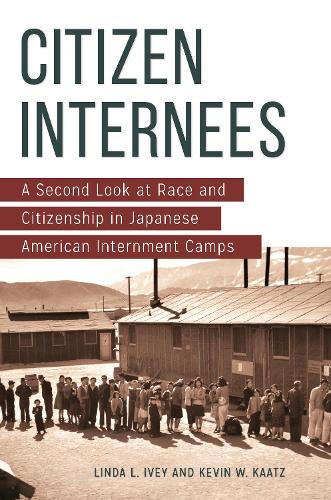
Citizen Internees: A Second Look at Race and Citizenship in Japanese American Internment Camps
(Hardback)
Publishing Details
Citizen Internees: A Second Look at Race and Citizenship in Japanese American Internment Camps
By (Author) Linda L. Ivey
By (author) Kevin W. Kaatz
Bloomsbury Publishing PLC
Praeger Publishers Inc
27th March 2017
United States
Classifications
Tertiary Education
Non Fiction
Modern warfare
Social and cultural history
Asian history
Ethnic studies / Ethnicity
940.531773089956
Winner of Outstanding Academic Title, 2017 2018
Physical Properties
Hardback
296
Width 156mm, Height 235mm
680g
Description
Through a new collection of primary documents about Japanese internment during World War II, this book enables a broader understanding of the injustice experienced by displaced people within the United States in the 20th century. In the 1940s, Japanese and Japanese American internees of Redwood City, CA, had a dedicated ally: J. Elmer Morrish, a banker who kept their businesses alive, made sure their taxes were paid, and safeguarded their properties until after the end of World War II and the internees were finally released. What were Morrish's motivations for his tireless efforts to help the internees How did the unjustly incarcerated deal with the loss of freedom in the camps, and how did they envision their future And how did the internees both cooperate with the U.S. government and attempt to resist victimization Citizen Internees: A Second Look at Race and Citizenship in Japanese American Internment Camps is an edited selection from a collection of more than 2,000 pieces of correspondencesome of which is previously unpublishedregarding the internment of Japanese and Japanese Americans from Redwood City, CA. These primary source documents reveal the experiences and emotions of a group of imprisoned people attempting to run the necessary day-to-day tasks of the lives they were forced to leave behindas property owners, taxpayers, and proprietors. Through these letters about practical matters, readers can gain insight into the internees' changing family relations, their financial concerns, and their struggles in making decisions about an uncertain future. The book also includes essays that supply background information, analysis of the documents' contents and meaning, and historical context.
Reviews
This may be the only book to present a local community's internment history expressly by highlighting a particular archive that is dedicated to documenting its imprisonment. . . . The internees' lives take shape in stories that speak to anyone who has endured injustice. The authors provide, variously, excerpts from letters, transcribed letters, and photocopies of letters that illuminate the internees' subjugation and that likewise feature what this archive has preserved. An extraordinary book whose subject matter speaks for itself. Summing Up: Essential. All public and academic levels/libraries. * Choice *
December 2017 Top Community College Resource * Choice *
The heart of Citizen Internees is the steady stream of mailings, numbering some 2,000, transacted between Morrish and the Redwood City inmates, which are excerpted throughout the first half of the book and selectively reproduced in full in the book's closing half. * Nichi Bei *
Author Bio
Linda L. Ivey, PhD, is associate professor of history at California State University, East Bay. Kevin W. Kaatz, PhD, is assistant professor of history at California State University, East Bay.
